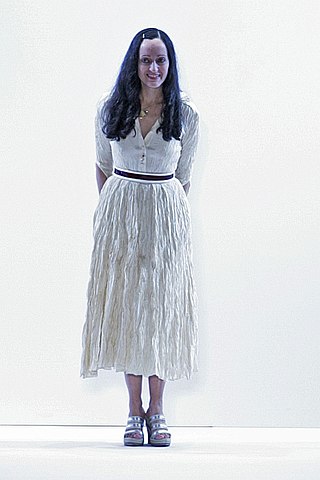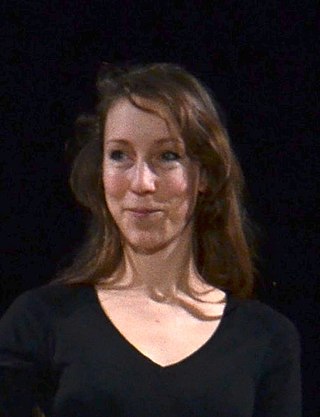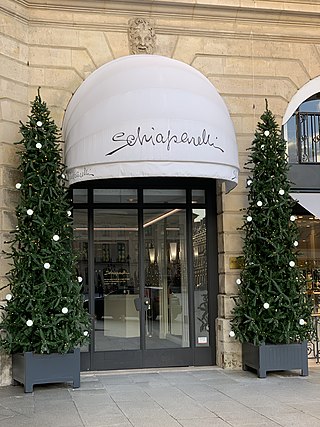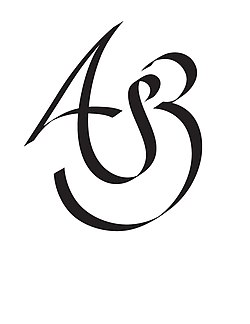
Lee Alexander McQueen was a British fashion designer and couturier. He founded his own Alexander McQueen label in 1992, and was chief designer at Givenchy from 1996 to 2001. His achievements in fashion earned him four British Designer of the Year awards, as well as the Council of Fashion Designers of America International Designer of the Year award in 2003. McQueen died by suicide in 2010 at the age of 40, at his home in Mayfair, London, shortly after the death of his mother.
Balenciaga is a Spanish luxury fashion line that was founded in 1919 by couturier Cristóbal Balenciaga in San Sebastián. Balenciaga produces ready-to-wear footwear, handbags, and accessories, and licenses its name and branding to Coty for fragrances. It is currently owned by the French corporation Kering.
Mainbocher is a fashion label founded by the American couturier Main Rousseau Bocher, also known as Mainbocher. Established in 1929, the house of Mainbocher successfully operated in Paris (1929–1939), and then in New York (1940–1971).

Hussein Chalayan, is a British-Cypriot fashion designer. He has won the British Designer of the Year twice, and he was awarded the MBE in 2006.
Olivier Theyskens is a Belgian fashion designer who has worked with major design houses, including Rochas, Nina Ricci and Theory.

Viktor & Rolf is a Dutch avant-garde luxury fashion house founded in 1993 by Viktor Horsting and Rolf Snoeren. For more than twenty years, Viktor & Rolf have sought to challenge preconceptions of fashion and bridge the divide between fashion and art. Viktor & Rolf have designed both haute couture and ready-to-wear collections. The duo is renowned for their avant-garde designs, which rely heavily on theatrical and performative fashion runways.
Behnaz Sarafpour is an Iranian-born American fashion designer, and fragrance designer. She had a ready-to-wear line of women's apparel bearing her name, Behnaz Sarafpour, Ltd. from 2001 until 2014, and has her own perfume line. Sarafpour has held design positions at Isaac Mizrahi, Narciso Rodriguez, Richard Tyler, Anne Klein, and Barneys New York. She has been based in New York City and Pound Ridge, New York.

Isabel Toledo was a Cuban-American fashion designer based in New York City. She was widely recognized in the fashion industry for her attention to craftsmanship and the "sophisticated simplicity" of her garments.

Phillip Lim is an American fashion designer of Chinese descent whose parents immigrated to America from Cambodia during the Cambodian genocide. Lim co-founded and worked at the Los Angeles-based fashion label Development from 2000 to 2004. In the fall of 2005, he co-founded 3.1 Phillip Lim with friend and business partner Wen Zhou, becoming the company's creative representative.

Peter Som is a Chinese American fashion designer. He was creative director for Bill Blass and creative consultant for Tommy Hilfiger, where he designed the women’s wear collection, prior to founding his eponymous label. Born and raised in the San Francisco Bay Area, Peter Som graduated from Connecticut College in 1993 with a degree in art history. He continued his studies at the Parsons School of Design where he apprenticed with American designers, Michael Kors and Calvin Klein. At Parsons, his talent was recognized through competitions; he won and was presented with the Parsons Gold Thimble Award by Isaac Mizrahi.
Davit Komakhidze known as David Koma is a Georgian fashion designer based in London, England.

Yeohlee Teng is an American fashion designer originally from Malaysia and of Chinese heritage. She received the Smithsonian's Cooper-Hewitt National Design Award for fashion design in 2004. Her work has been displayed at the Metropolitan Museum of Art, New York and Victoria & Albert, London.

Neri Oxman is an Israeli-American designer and former professor known for art that combines design, biology, computing, and materials engineering. She coined the phrase "material ecology" to define her work.
Lyn Devon is a fashion designer of luxury American sportswear working in New York City. Her atelier is in Soho.

Iris van Herpen is a Dutch fashion designer known for fusing technology with traditional haute couture craftsmanship. Van Herpen opened her own label Iris van Herpen in 2007. In 2011, the Dutch designer became a guest-member of the Parisian Chambre Syndicale de la Haute Couture, part of the Fédération française de la couture. Since then, Van Herpen has continuously exhibited her new collections at Paris Fashion Week. Van Herpen's work has been included in the Metropolitan Museum of Art, the Victoria & Albert Museum, the Cooper-Hewitt Museum in New York and the Palais de Tokyo in Paris.

Digital Fashion is a field of fashion design that relies on 3D software or artificial intelligence to produce hyper-realistic, data-intensive digital 3D garment simulations that are digital-only products or digital models for physical products. Digital garments can be worn and presented in virtual environments, social media, online gaming, virtual reality (VR), and augmented reality (AR) platforms. The field contributes to the development of a more sustainable future for the fashion industry It has often been praised as an answer to ethical and creative concerns of traditional fashion by promoting innovation, reducing waste, and encouraging conscious consumption.
Maison Margiela, formerly Maison Martin Margiela, is a French luxury fashion house founded by Belgian designer Martin Margiela and Jenny Meirens in 1988 and headquartered in Paris. The house produces both haute couture-inspired artisanal collections and ready-to-wear collections, with the former influencing the designs of the latter. Product lines include womenswear, menswear, jewellery, footwear, accessories, leather goods, perfumes and household goods. Known for deconstructive and avant-garde designs with unconventional materials, Maison Margiela has traditionally held live shows in unusual settings, for example empty metro stations and street corners. Models' faces are often obscured by fabric or long hair to direct attention to the clothes and design. Margiela resigned as creative designer in 2009 and John Galliano was appointed to the role in 2014.
Bernhard Willhelm is a German fashion designer.
Noa Raviv is an Israeli fashion designer known for her use of grid patterns and employment of 3D printing in her work. She attended Shenkar College of Engineering and Design, graduating in 2014. She collaborated with the tech printing firm Stratasys on two pieces which were exhibited in 2016 in the exhibition Manus X Machina at the Anna Wintour Costume Center in New York City at the Metropolitan Museum of Art. Raviv's work has been as described as manifesting the aesthetic phenomenon of hypertexture.

Maison Schiaparelli is a haute couture house created by avant-garde Italian fashion designer Elsa Schiaparelli in 1927, and moving towards luxury ready-to-wear after being bought in 2007 by Diego Della Valle. The house is famous for its eccentric fashions, the use of Surrealism in its collections, its sense of humour, the "shocking Pink" color, gender crossing, and its use of human anatomy depictions, among other unconventional themes.















